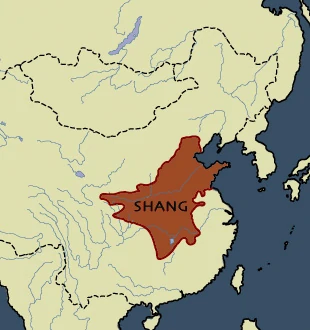The Shang ruled from 1600 to 1046 B. C. heralding in the Chinese Bronze Age. The brown land on the map to the left is the Shang dynasty. Taiwan is not even a part of this dynasty that ended in 1046 B.C..
The Shang were known for their advances in math, astronomy, artwork and military technology.
Much of the history of the Shang Dynasty has been deciphered from oracle bones found in Anyang, which present a kingdom at war, with narratives of shifting alliances with other powers.
Prisoners of war were used as slaves or sometimes slaughtered for sacrifice. Within the religion, sacrifice was practiced, sometimes in large groups.
Within Shang culture, the king also functioned as a priest. It was believed that ancestors communicated through the god Di, and the Shang king led in the worship of Shangdi, considered the supreme ancestor, as well as communicating with the other ancestors.
So, here is the complete theological empire of Shang. The king was not only the ultimate governing authority, but, also the authority on the religion of the day. These people thought nothing of shedding their quite benevolence to carry out war because they no longer used sticks and stones. They had the high tech solution of casting bronze into metal.
The casting was crude at that time, but, it was a mixture or alloy is you will, of copper and tin. There were also other metals and sometimes non-metals blended in to fashion weapons.
The Zhou Dynasty (click here) started as a small town and the point of the Wei River Valley. These people must have thought nothing of their small town at the time. But little did they know that this was the beginning of the world's longest standing dynasty. Soon enough, this little town was transformed into the center for their rapidly growing influence and power. This steady rise to power and control eventually climaxed with the overthrow of the Shang Dynasty.
The Zhou Dynasty is in the picture to the right. It swallowed whole the Xia Dynasties and also the Shang Dynasty. It grew with it's then advanced use of bronze into lands further east that had not been tamed before.
The theological basis of the Zhou Dynasty.
The Mandate of Heaven is based of four key parts:
1. The only right to rule must be granted by heaven.
2. There may only be one ruler because there is only one heaven.
3. The right to rule is not limited by one dynasty only.
4. The right to rule is base on the virtue of the ruler.
These key parts give the leader supreme power. This also gives the ruler prestige and religious importance. But, the rulers' power must always be kept in check by virtue, or their moral standards.
This is why this empire was call the Celestial Empire. It was protected by the Mandate of Heaven and it has been the only Chinese dynasty to last longer than 800 years.
The organization of battle lines was through a feudal system. While European history provides for this type of organization, the Chinese were organizing in the same way and separately. This rise of battle would be similar in it's organization but not in it's origins. The duplicity of the European feudal system and the Chinese feudal systems would state something about the quality of human advancement and it's discoveries in metals and their uses. Intelligence was not only isolated in Europe, it was also engaged in China.
The picture to the left is that of a Bronze Age battle helmet of the later Zhou Dynasty of 481-221 BCE.
The feudal system of any major power at the time was more or less an alliance of all the feudal lords with a consolidated leader aligned with the king (emperor). I find the word Hegemon aligning with the definition of hegemony. It all fits into origins of language.
The Zhou Dynasty existed in growing dynamics until 221 B.C. They were not sea faring people and Taiwan was a very distant shore no one in this dynasty ever entertained as a place to invade.


